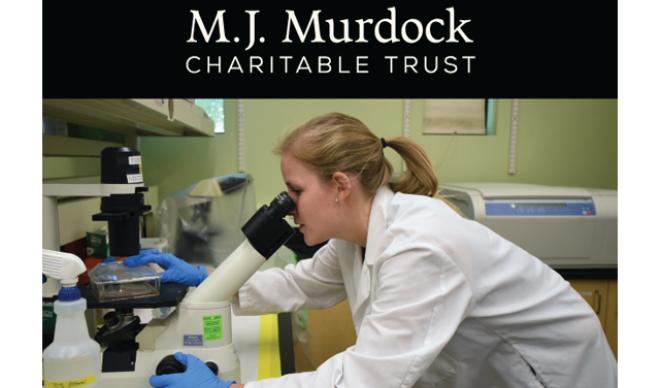
This time last year, as students at The College of Idaho were thinking about final exams, the administration at the College was awaiting a final grade on a type of exam that could have long-lasting benefits for the campus community.
Then, one day, co-president Doug Brigham received a phone call from Moses Lee of the M.J. Murdock Charitable Trust.
“We were on pins and needles until Moses called Doug and said, ‘You got it,’” said Regina Maldve, the College’s Director of Academic Grants and Awards. “It’s at the presidents’ level that this grant is awarded.”
The invitation-only grant, the Murdock College Science Research Program (MCSRP), is a three-year grant worth over $400,000 for the science programs at The College of Idaho. This particular grant is phase two and follows a previous initial “ramp-up” grant that is aimed at creating a self-sufficient scientific research capacity for smaller colleges and universities in the northwest. The College received the initial grant in 2017 and, after performing well, was invited to apply for the MCSRP grant. Earning this grant puts the College alongside peer institutions like Willamette University, Pacific University, and the University of Puget Sound as MCSRP schools.
“They (the Murdock Trust) are enabling us to achieve our strategic goals,” said David Douglass, Provost and Dean of Faculty at The College of Idaho. “In this case, it’s our faculty working with students to produce scientific research.”
It’s a collaborative effort across the College’s scientific community – specifically biology, chemistry, geology, and physics - and it targets the research aspect, whether it is using funds to purchase equipment, to support faculty research, or pay students to conduct research studies. Upon learning the College had received the grant, a dozen students were able to perform research last summer. Maldve says that number will increase to 13 this summer across multiple scientific disciplines.
Physics professor Katie Devine, the grant’s administrator on campus, explained the grant’s ripple effect.
“It’s meant to be a launchpad, it’s not the finish line,” she said. “The exciting thing is how transformative this has been. Developing programming for summer students, weekly meetings, getting the students together, increasing the numbers but also having a cohesive program. It doesn’t matter if you’re studying physics, biology, or chemistry, it has really transformed the vibe over in Boone (Science Hall). These grants get a lot of the credit for that.”
That’s because the ramp-up grant and the ensuing MCSRP grant must be supported by matching investments by the College, which acts to ultimately create a scientific research endowment. That, in turn, creates opportunities for generations of students for years to come.
“We have to pay as well,” said Douglass. “There are matching costs involved. The College has to pony up for a variety of different resources.”
It isn’t just a cash donation from the Trust. It’s an investment in scientific study and research at the College that required significant preparation by Maldve and the entire science faculty on campus. The group spent several months preparing its paper application, including an extensive collection of data and submitted it to the Murdock Trust in August 2022. Then, in February 2023, a team, led by Lee, visited the College. The group carefully researched the College in person to ensure adequate infrastructure was in place to support the grant and its goals. Then, Lee and his team presented their findings to the Murdock Trust’s board and a peer review group before final approval was granted in the spring of 2023.
The College has received grants from the Murdock Trust before, but this was a particular grant whose long-term effect had been on Douglass’s radar since he arrived in Caldwell seven years ago.
“We have to do it, but we also get to do it,” he said. “It brings us into contact with terrific mentors and advisors who can provide information for the College in terms of our own developmental path.”
The collaboration, the paperwork and the time invested by several people create opportunities for students to get into the labs.
“This is mentored, original research,” Douglass said. “It is legitimate, top-tier faculty conducting research in the fields in which they are experts, working with our students as collaborators.”
That’s one important aspect. Maldve pointed out another.
“All of this helps the College with recruiting and retention,” she added. “Not only recruiting students but also recruiting faculty, to know that we’ve got a research program that they can be a part of.”
The partnership with the Murdock Trust ensures that the research program will be on solid ground for the future.
“It requires a lot of commitment from the College, so it’s great to have this grant which is meant to enhance the sustainability of the internal research program,” Devine said.
The College of Idaho has a 133-year-old legacy of excellence. The College is known for its outstanding academic programs, winning athletics tradition, and history of producing successful graduates, including eight Rhodes Scholars, three governors, and countless business leaders and innovators. Its distinctive PEAK Curriculum challenges students to attain competency in the four knowledge peaks of humanities, natural sciences, social sciences, and a professional field—empowering them to earn a major and three minors in four years. The College’s close-knit, residential campus is located in Caldwell, where its proximity both to Boise and to the world-class outdoor activities of southwest Idaho’s mountains and rivers offers unique opportunities for learning beyond the classroom. For more information, visit www.collegeofidaho.edu.